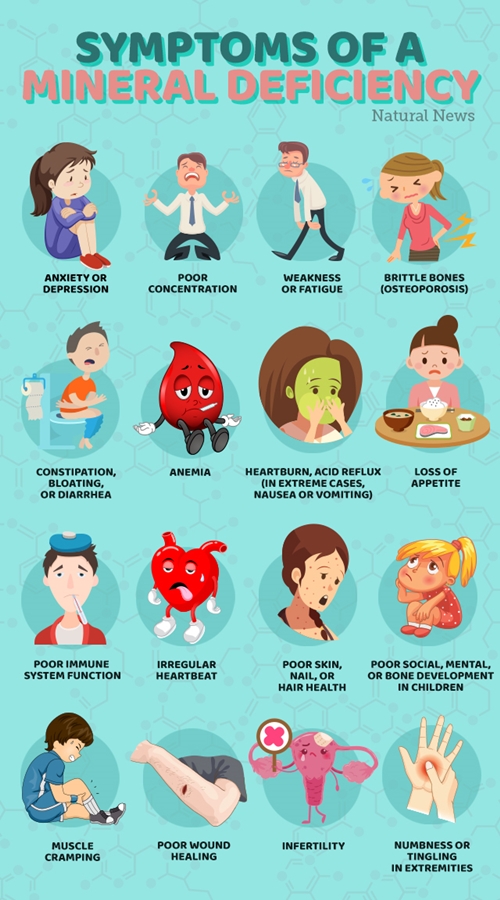Low in minerals
 |
|
What are the symptoms of mineral
deficiency?
|
What types of mineral deficiency are there?There are five main categories of mineral deficiency: calcium, iron, magnesium, potassium, and zinc. Calcium deficiencyCalcium is needed for strong bones and teeth. It also supports proper function of your blood vessels, muscles, nerves, and hormones. Natural sources of calcium include milk, yogurt, cheese, and small fish with bones, beans, and peas. Vegetables such as broccoli, kale, and Chinese cabbage also provide calcium. Some foods are also fortified with the mineral, including tofu, cereals, and juices. A calcium deficiency produces few obvious symptoms in the short term. That’s because your body carefully regulates the amount of calcium in the blood. Lack of calcium over the long term can lead to decreased bone mineral density called osteopenia. If left untreated, osteopenia can turn to osteoporosis. This increases the risk of bone fractures, especially in older adults. Severe calcium deficiency is usually caused by medical problems or treatments, such as medications (like diuretics), surgery to remove the stomach, or kidney failure. Symptoms of a severe deficiency include:
Iron deficiencyMore than half of the iron in your body is in red blood cells. Iron is an important part of hemoglobin, a protein that carries oxygen to your tissues. Iron is also a part of other proteins and enzymes that keep your body healthy. The best sources of iron are meat, poultry, or fish. Plant-based foods such as beans or lentils are also good sources. Iron deficiency develops slowly and can cause anemia. It’s considered uncommon in the United States and in people with healthy diets. But, the World Health Organization estimated in a 2008 report that iron deficiency causes approximately half of all anemia cases worldwide. The symptoms of iron-deficiency anemia include feeling weak and tired. You may be performing poorly at work or school. Children may exhibit signs through slow social and cognitive development. Magnesium deficiencyThe body needs magnesium for hundreds of chemical reactions. These include responses that control blood glucose levels and blood pressure. Proper function of muscles and nerves, brain function, energy metabolism, and protein production are also controlled by magnesium. Roughly 60 percent of the body’s magnesium resides in the bones while nearly 40 percent resides in muscle and soft tissue cells. Good sources of magnesium include:
Magnesium deficiency is uncommon in healthy people. The kidneys can keep magnesium from leaving the body through the urine. Still, certain medications and chronic health conditions like alcoholism may cause magnesium deficiency. Magnesium needs are also highly influenced by the presence of disease. In this situation, the RDA for magnesium may not be sufficient for some individuals. Early signs of magnesium deficiency include:
Magnesium deficiency can lead to the following symptoms if left untreated:
Potassium deficiencyPotassium is a mineral that functions as an electrolyte. It’s required for muscle contraction, proper heart function, and the transmission of nerve signals. It’s also needed by a few enzymes, including one that helps your body turn carbohydrates into energy. The best sources of potassium are fruits and vegetables, such as bananas, avocado, dark leafy greens, beets, potatoes, and plums. Other good sources include orange juice and nuts. The most common cause of potassium deficiency is excessive fluid loss. Examples can include extended vomiting, kidney disease, or the use of certain medications such as diuretics. Symptoms of potassium deficiency include muscle cramping and weakness. Other symptoms show up as constipation, bloating, or abdominal pain caused by paralysis of the intestines. Severe potassium deficiency can cause paralysis of the muscles or irregular heart rhythms that may lead to death. Zinc deficiencyZinc plays a role in many aspects of the body’s metabolism. These include:
It’s also important for proper growth and development during pregnancy, childhood, and adolescence. Zinc is found in animal products like oysters, red meat, and poultry. Other good sources of zinc include:
Zinc deficiency can cause loss of appetite, taste, or smell. Decreased function of the immune system and slowed growth are other symptoms. Severe deficiency can also cause diarrhea, loss of hair, and impotence. It can also prolong the process that your body takes to heals wounds.What causes mineral deficiency?One major cause of mineral deficiency is simply not getting enough essential minerals from food or supplements. There are different types of diets that might result in this deficiency. A poor diet that relies on junk food, or a diet that lacks adequate fruits and vegetables can be possible causes. Alternately, a very low-calorie diet may produce this deficiency. This includes people in weight-loss programs or with eating disorders. Older adults with poor appetites may also not get enough calories or nutrients in their diet. Restricted diets may also cause you to have a mineral deficiency. Vegetarians, vegans, and people with food allergies or lactose intolerance might experience mineral deficiency if they fail to manage their diet effectively. Difficulty with digestion of food or absorption of nutrients can result in mineral deficiency. Potential causes of these difficulties include:
Mineral deficiency can also result from an increased need for certain minerals. Women, for instance, may encounter this need during pregnancy, heavy menstruation, and post menopause. Contact your healthcare provider if you experience prolonged fatigue, weakness, or poor concentration. The symptoms may be a sign of a mineral deficiency or another health condition. |
| Herbal remedies to remineralize the body | |||||||||
|
|||||||||
|
|
|||||||||||||||||
|


